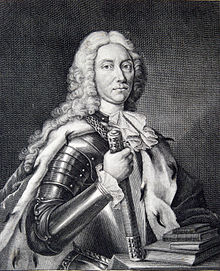Dmitri Kantemir
| Dimitrie Cantemir | |
|---|---|

Portrait of Dimitrie Cantemir from the first edition of Descriptio Moldaviae (1716)
|
|
| Native name | Dimitrie Cantemir |
| Born |
October 26, 1673 Silișteni (now Dimitrie Cantemir), Vaslui County |
| Died | August 21, 1723 (aged 49) Dmitrovsk, Oryol Oblast |
| Resting place |
Three Holy Hierarchs Church, Iași 47°9′35″N 27°35′5″E / 47.15972°N 27.58472°E |
| Nationality | Romanian |
| Occupation | Encyclopedist, ethnographer, geographer, philosopher, historian, linguist, musicologist, composer |
| Notable work | Divanul sau gâlceava înțeleptului cu lumea, Descriptio Moldaviae |
| Title | Prince of Moldavia |
| Term | March–April 1693 1710–1711 |
| Predecessor |
Constantin Cantemir Nicolae Mavrocordat |
| Successor |
Constantin Duca Lupu Costachi |
| Spouse(s) |
Casandra Cantacuzino (m. 1699) Anastasia Trubetskaia |
| Children | Matei Constantin Șerban Maria Antioh Smaragda |
| Parent(s) | Constantin Cantemir Ana Cantemir (née Bantaș) |
Dimitrie or Demetrius Cantemir (Romanian pronunciation: [diˈmitri.e kanteˈmir] (![]() listen); 1673–1723), also known by other spellings, was a Moldavian soldier, statesman, and man of letters. He was twice voivode of Moldavia (March–April 1693 and 1710–1711). During his second term, he allied his state with Russia in their war against Moldavia's Ottoman overlords; Russia's defeat forced Cantemir's family into exile and the replacement of the native voivodes by the Greek phanariots. Cantemir was also a prolific writer, variously a philosopher, historian, composer, musicologist, linguist, ethnographer, and geographer. His son Antioch, Russia's ambassador to Great Britain and France and a friend of Montesquieu and Voltaire, would go on to be known as "the father of Russian poetry".
listen); 1673–1723), also known by other spellings, was a Moldavian soldier, statesman, and man of letters. He was twice voivode of Moldavia (March–April 1693 and 1710–1711). During his second term, he allied his state with Russia in their war against Moldavia's Ottoman overlords; Russia's defeat forced Cantemir's family into exile and the replacement of the native voivodes by the Greek phanariots. Cantemir was also a prolific writer, variously a philosopher, historian, composer, musicologist, linguist, ethnographer, and geographer. His son Antioch, Russia's ambassador to Great Britain and France and a friend of Montesquieu and Voltaire, would go on to be known as "the father of Russian poetry".
...
Wikipedia
